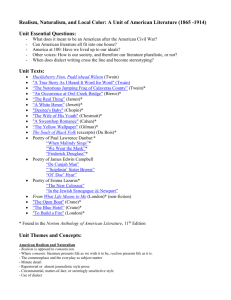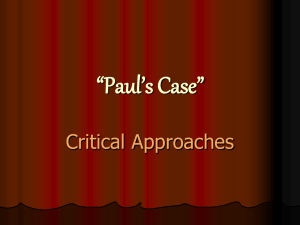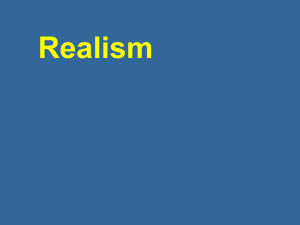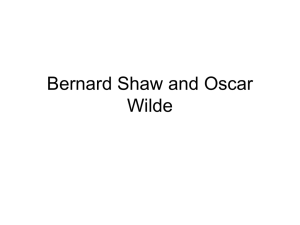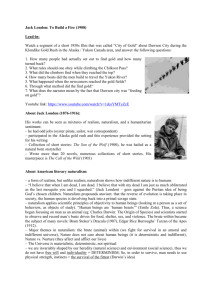The Modern Stage (2) Shaw and British Social Realism
advertisement
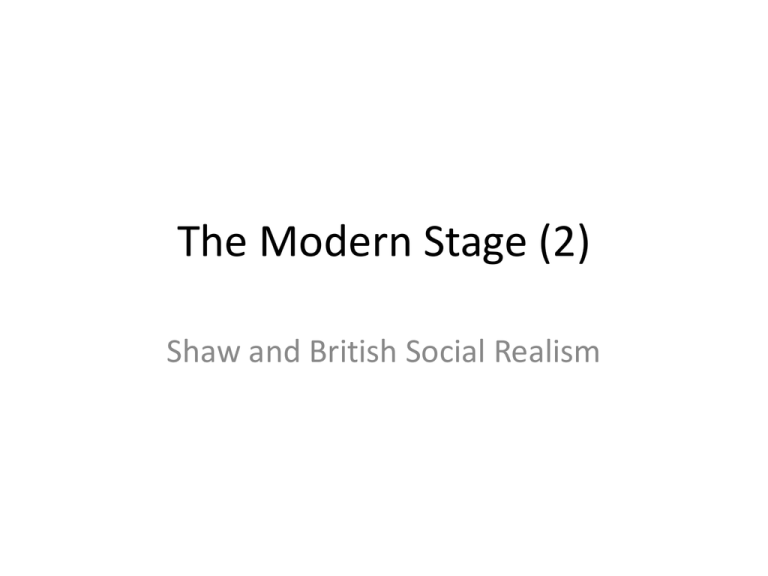
The Modern Stage (2) Shaw and British Social Realism Dividing the Text: Units/Bits + Objectives/Tasks • Was the exercise useful? Why? (or why not?) • Did you learn anything new about the character or that particular scene? • Did the performance feel more truthful? • What would you do differently? Dividing the Text: Units/Bits + Objectives/Tasks • Bit (noun): manageable section of the play, as identified by actors and director • Given Circumstances: situation of the character within a particular ‘bit’ of the play • Objective (verb): what the character wants to achieve within a given set of circumstances • Action: what the character does to fulfil the objective Dividing the Text: Units/Bits + Objectives/Tasks How to recognise a new ‘bit’? • when an event happens, whether physical or psychological, that affects what the characters are thinking or doing on stage • when a character changes objective and starts wanting something else • when a character enters or exits the stage [from O’Brien, Nick (2011) Stanislavski in Practice: Exercises for Students. New York, Routledge] European Connections France: Russia: Émile Zola Constantin Stanislavski (Moscow Art Theatre) André Antoine (Théâtre Libre) Anton Chekhov Naturalism / Realism Scandinavia: Britain: Henrik Ibsen (Norwegian) G. Bernard Shaw (Irish) August Strindberg (Swedish) Elizabeth Robins (American) Elizabeth Robins (1862-1952) • Actor and writer • Champion of Ibsen: played Mrs Linde and Hedda Gabler • Wrote first suffragist play: Votes for Women! (Royal Court, 1907) • Remained independent in her private life (never remarried) Naturalism and Realism: Synonyms? • Christopher Innes: Naturalism is the approach (theory). Realism is the effect (practice) • Stanislavski: Naturalism is the indiscriminate reproduction of the surface of life. Realism selects only the typical elements, revealing what lies under the surface... • Shaw: verisimilitude (accurate reproduction of actual social conditions = Naturalism) should give way to veracity (philosophical truth = Realism) G. Bernard Shaw (1856-1950) A prolific writer: plays, fiction, journalism, essays, letters... A political activist: socialist (Fabian), pacifist, humanist... Ibsenite! Mrs Warren’s Profession (1893) • Scandalous subject matter: Censored by the Lord Chamberlain in 1898 Condemned after its first (private) performance in 1902 Produced professionally in England only in 1925 • A Shavian ‘problem play’: Dialogical exchange (rational, non-sentimental) Exploration of social contradictions A ‘thesis play’ or ‘play of ideas’ The ‘New Woman’ • A turn-of-the-century phenomenon, in literature/theatre and life • Rejection of conventional gendered behaviour and ‘feminine’ appearance • Pursuit of education and employment • A paradigm and/or a threat (the ‘unwomanly woman’) • Vivie Warren: An icon of female emancipation? A victim of society? A heartless capitalist, just like her mother? Working with the Text a) Vivie and Praed (Act 1) b) Vivie and Mrs Warren (Act 2) c) Vivie and Mrs Warren (Act 4) Activity: 1. Read the whole extract aloud (3 or 4 pages) 2. Analyse 2 pages: emphasis on subtext 3. Perform 2 pages: emphasis on movement

